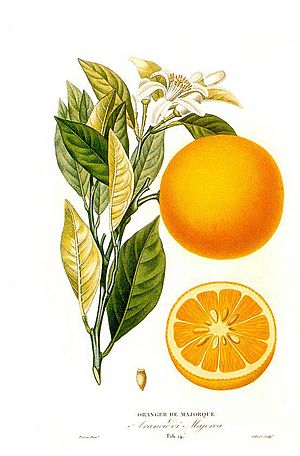Orange oil facts for kids

Orange oil is a special kind of oil that comes from the skin of an orange fruit. It's different from most other essential oils because it's made as a by-product when people make orange juice. They use a process called centrifugation to spin the orange peels and get the oil out. This oil is mostly made of something called d-limonene, which is why it often smells so much like oranges!
Contents
What is Orange Oil Made Of?
The exact things found in orange oil can change. This depends on where the oranges grew, the time of year, and how the oil was taken out. Scientists have found hundreds of different parts in orange oil using special tools.
Most of the substances in orange oil belong to a group called terpenes. The main one is limonene. Other important parts include long chain alcohols and aldehydes like 1-octanol and octanal. The orange color of the oil comes from a substance called sinensetin.
| Compound | Italian Orange Oil Concentration [%] | Valencia Orange Oil Concentration [%] | Valencia Orange Oil Concentration [%] | Valencia Orange Oil Concentration [%] |
|---|---|---|---|---|
| Limonene | 93.67 | 91.4 | 95.17 | 97.0 |
| α-Pinene | 0.65 | 1.4 | 0.42 | – |
| Sabinene and β-Pinene | 1.00 | 0.4 | 0.24 | – |
| Myrcene | 2.09 | 4.3 | 1.86 | 0.03 |
| Octanal | 0.41 | – | – | – |
| Linalool | 0.31 | 0.8 | 0.25 | 0.3 |
| δ-3-Carene | 0.31 | – | – | – |
| Decanal | 0.27 | 0.4 | 0.28 | – |
How Orange Oil is Used
Fighting Pests in Buildings
In some places, like California and Florida in the United States, d-Limonene (orange oil) is approved to get rid of pests like drywood termites and Formosan termites. It's used in products that help control these insects in buildings. Many people prefer using orange oil for pest control instead of traditional methods that involve covering the whole building.
Natural Pest Control
Orange oil can also be used in natural ways to control pests. It can help get rid of ants and other insects by erasing their scent trails, which they use to find their way. It can also harm their outer shells, called exoskeletons. This helps to stop new bug problems from starting.
Orange oil can also help control drywood termites, but it only kills the termites that touch it directly.
Cleaning Around the House
Orange oil is a good cleaner. It's also added to some wood polishes and waxes to help clean and protect wooden furniture.
Aromatherapy and Scents
Aromatherapy is a practice that uses essential oils for well-being. People believe that the scent of orange oil can have good effects, but more scientific studies are needed to fully prove these health effects.
Safety Information About Orange Oil
The main part of orange oil, limonene, can be a mild irritant. This means it might bother your skin a little because it can dissolve the natural oils that protect your skin. When people use orange oil for commercial purposes, like pest control, they often need to wear protective gloves.
Limonene can also become a skin sensitizer if it mixes with air. This means that after being exposed to it for a long time, some people might develop an allergic reaction on their skin. However, most cases of irritation have happened to people who work with the pure oil in factories.
Scientists have studied limonene carefully. The IARC says that d-limonene is "not classifiable as to its carcinogenicity to humans." This means there isn't enough evidence to say it causes cancer in people.
Orange oil is also flammable, so it can catch fire. It's important to keep it away from flames or heat.
See also
 In Spanish: Aceite de naranja para niños
In Spanish: Aceite de naranja para niños
 | Kyle Baker |
 | Joseph Yoakum |
 | Laura Wheeler Waring |
 | Henry Ossawa Tanner |

